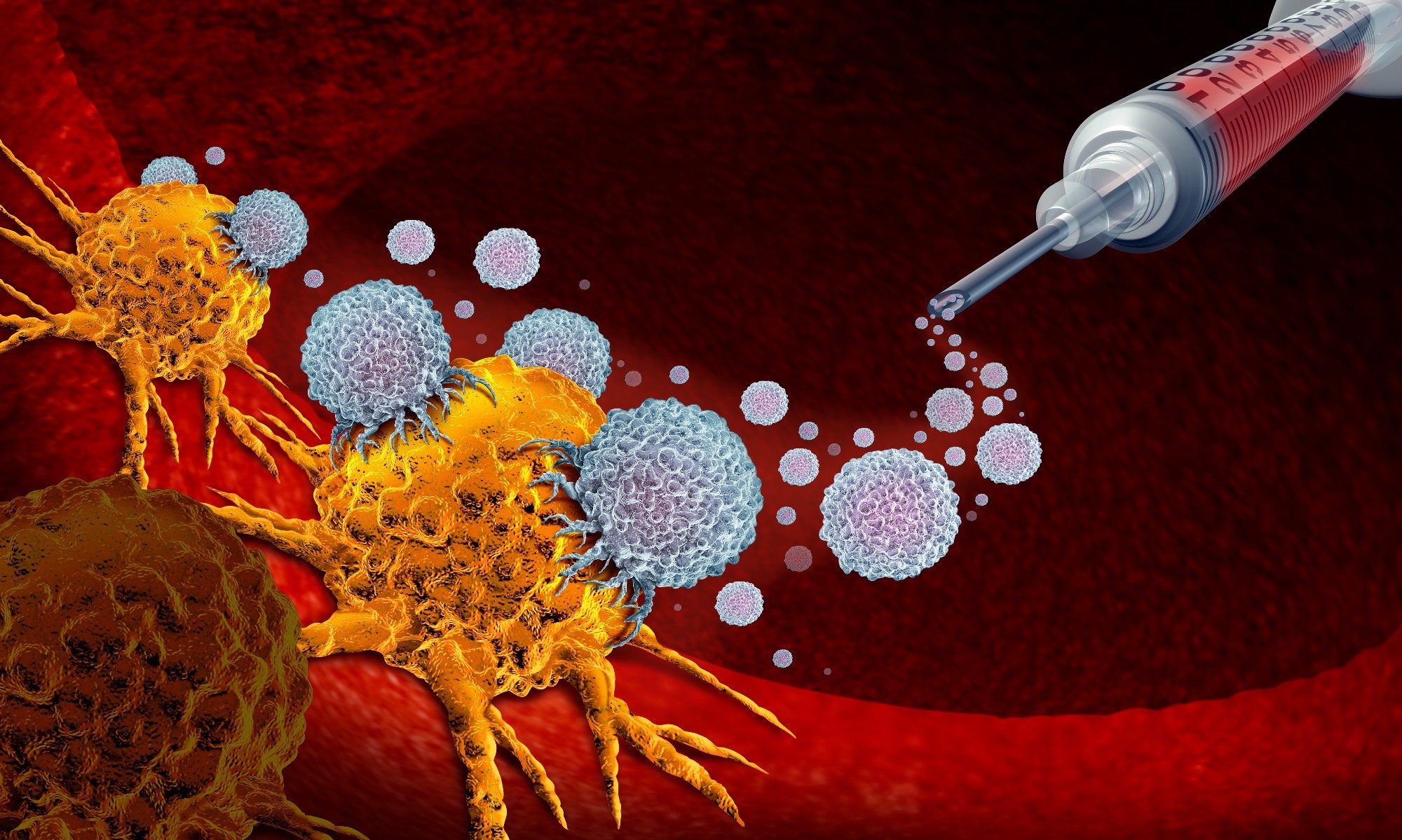Scientists reveal that the structure of gut bacteria-derived LPS determines whether cancer immunotherapy succeeds or fails—unlocking a new path to personalized treatments.
 Analysis: Gut microbiota-derived hexa-acylated lipopolysaccharides enhance cancer immunotherapy responses. Image Credit: Lightspring / Shutterstock
Analysis: Gut microbiota-derived hexa-acylated lipopolysaccharides enhance cancer immunotherapy responses. Image Credit: Lightspring / Shutterstock
In a recent study published in the journal Nature Microbiology, researchers investigated the influence of gut microbiota-derived hexa-acylated lipopolysaccharides (LPS) on immune checkpoint inhibitor (ICI) efficacy in cancer treatment.
Background
Every year, cancer claims over 10 million lives globally, making it one of the leading causes of death. Despite advancements in immunotherapy, many patients fail to respond, leaving researchers searching for solutions.
Could the key to more effective treatment lie within our gut microbiome? ICIs, such as anti-programmed cell death protein 1 (anti-PD-1), have revolutionized cancer therapy by harnessing the body’s immune system to fight tumors. However, response rates vary significantly.
Research suggests that the gut microbiome plays a pivotal role in modulating immune responses, yet the precise mechanisms remain poorly understood. Previous studies linked LPS-producing bacteria to poorer immunotherapy outcomes, but this study reveals that the structure of LPS—whether hexa- or penta-acylated—plays a decisive role.
While some forms of LPS stimulate immune responses, others suppress them, leading to inconsistent outcomes. Hexa-acylated LPS has now been identified as an immunostimulatory factor that enhances anti-PD-1 responses, whereas penta-acylated LPS may suppress them. Understanding these interactions could transform immunotherapy, offering hope to millions of patients worldwide.
About the Study
To examine the role of gut microbiota-derived hexa-acylated LPS in immunotherapy, the researchers performed a metagenomic analysis of patient microbiomes, clustering them into functional enterotypes rather than relying solely on bacterial species composition. Fecal samples from 112 melanoma patients undergoing anti-PD-1 treatment were analyzed.
Based on clinical outcomes, patients were classified as responders or non-responders. Bioinformatic analyses were performed to identify bacterial species encoding LPS biosynthesis genes, particularly those responsible for hexa- and penta-acylation of lipid A, a key component of LPS.
In parallel, a mouse model of colorectal adenocarcinoma (MC38) was utilized to assess the functional impact of microbiota-derived LPS on anti-PD-1 therapy. Mice were pre-treated with polymyxin B (PMB), a selective antibiotic targeting hexa-acylated LPS-producing bacteria, or a broad-spectrum antibiotic cocktail.
Following two weeks of pre-treatment, subcutaneous tumor implantation was performed. Anti-PD-1 was administered intraperitoneally from day 10 post-implantation. A separate cohort received oral supplementation of purified hexa- or penta-acylated LPS.
Tumor volumes were measured over time, and immune responses were assessed through flow cytometry of tumor-infiltrating lymphocytes and myeloid cells. Crucially, the study examined the activation of Toll-like receptor 4 (TLR4), which recognizes LPS and modulates immune activation. Cytokine secretion and nuclear factor kappa B (NF-κB) activation in macrophages were analyzed in vitro. Statistical analyses, including Kruskal-Wallis tests and two-way analysis of variance (ANOVA), were performed to compare immune responses and tumor growth rates across treatment groups.
Study Results
Metagenomic analysis revealed that responders to anti-PD-1 therapy exhibited a higher abundance of bacterial species encoding genes for hexa-acylated LPS biosynthesis. In contrast, non-responders showed enrichment of bacteria producing penta-acylated LPS.
Functional annotation of bacterial taxa confirmed that the presence of hexa-acylated LPS, rather than total LPS levels, was associated with a stronger anti-tumor immune response. This finding clarifies previous inconsistencies in research linking LPS to immunotherapy outcomes.
In the mouse model, PMB treatment significantly depleted hexa-acylated LPS-producing bacteria, leading to a loss of anti-PD-1-induced tumor reduction. Similarly, broad-spectrum antibiotics abolished tumor shrinkage, highlighting the essential role of hexa-acylated microbiota-derived LPS in mediating immunotherapy responses.
Flow cytometry analysis demonstrated that PMB-treated mice exhibited reduced infiltration of interferon-gamma (IFN-γ)-producing Cluster of Differentiation 8 (CD8)+ T cells and increased regulatory T cell populations, indicative of immunosuppression.
Conversely, oral administration of purified hexa-acylated LPS in mice enhanced anti-PD-1 efficacy, leading to greater tumor regression and increased infiltration of tumor-specific cytotoxic T cells. This effect was entirely absent in mice receiving penta-acylated LPS, which failed to restore anti-PD-1 responses. In vitro, assays further confirmed that hexa-acylated LPS selectively activated TLR4 and NF-κB, triggering cytokine secretion in macrophages, whereas penta-acylated LPS antagonized immune activation.
Mechanistic investigations revealed that blocking TLR4 with a small-molecule antagonist abolished the beneficial effects of hexa-acylated LPS on anti-PD-1 therapy. This underscores the necessity of TLR4 signaling in microbiota-driven immunotherapy enhancement.
Furthermore, the relative abundance of hexa-acylated LPS-encoding taxa in patient fecal samples correlated with superior clinical outcomes, suggesting its potential as a predictive biomarker for immunotherapy response.
Conclusions
To summarize, these findings underscore the profound impact of microbiota-derived hexa-acylated LPS in enhancing the effectiveness of anti-PD-1 immunotherapy.
This study suggests that identifying patients with a microbiome enriched in hexa-acylated LPS-producing bacteria could serve as a biomarker for immunotherapy success.
The implications extend beyond individual patients, offering a global opportunity to refine immunotherapy protocols and increase survival rates. Although microbiome-based interventions such as probiotics, dietary modifications, or fecal transplants are promising areas of research, further studies are required to confirm their clinical efficacy.
Additionally, functional enterotype profiling may provide a more precise method for predicting patient responses than traditional taxonomic analyses. This could pave the way for personalized strategies that optimize gut microbiota composition to enhance immunotherapy outcomes.
Journal reference:
- Sardar, P., Beresford-Jones, B.S., Xia, W. et al. Gut microbiota-derived hexa-acylated lipopolysaccharides enhance cancer immunotherapy responses. Nat Microbiol (2025), DOI: 10.1038/s41564-025-01930-y, https://www.nature.com/articles/s41564-025-01930-y